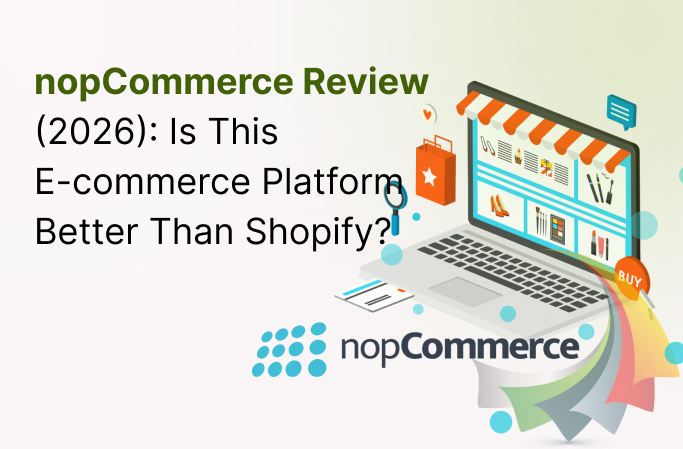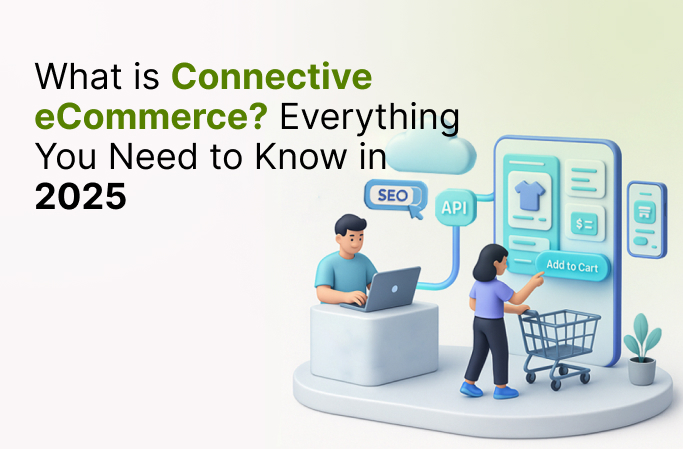Top 10 Shopify Competitors That Are Outperforming This E-commerce Giant in 2025

It’s no secret how big the Shopify ecosystem is; when it was first launched in 2006, who would have thought Shopify would once become one of the e-commerce giants? The reason behind its massive popularity and ever-growing revenue could be its convenience and ease of use. When it comes to setting up a digital storefront, Shopify is literally a whole package that includes site hosting, SEO optimization, inventory management, and order and shipping workflows. While many are leveraging the potential of this e-commerce platform, others are still wandering to find the best Shopify competitors. But why?
Well! There’s a simple answer to it – sometimes, your strength itself becomes your weakness. While this extensive suite of tools and services can help you with all your e-commerce needs, it might also exhaust or overwhelm you. Depending on your business requirements, you might not require all the services that come standard with Shopify Competitors. Maybe a dynamic website is what you need.
If you have used Shopify before or have heard everything bad about the platform, it is obvious that you feel confused and lost. However, we have done extensive research to find out some of the best Shopify competitors and alternatives. This blog will feature a head-to-head comparison between Shopify and other e-commerce platforms to find the best eCommerce website builder in 2025. So, let’s get started!
How Big Is the E-Commerce Market?
- The global e-commerce market was valued at $8.25 Trillion in 2022 and is projected to reach $44.83 by the end of 2032 at a CAGR of 12.22%. (Source: Precedence Research)
- As of July 24, Shopify is currently worth $87.15 billion. The current Shopify stock price is $67.34. (Source: Companies Market Cap)
- Shopify holds about 21% of the UK’s eCommerce market share, while WooCommerce holds a 22% share. (Source: Statista)
- There are over 2.71 billion online shoppers worldwide, translating into 33% of the world’s population. (Source: SellersCommerce)
- Woocommerce holds 29% of all e-commerce websites, followed by Shopify with 19% and Magento with 8%. (Source: Appmysite)

Top 10 Shopify Competitors in 2025
This list of top Shopify alternatives features some of the best e-commerce platforms that are even more cost-effective, growth-oriented, and easy to use.
Here are some of the best Shopify competitors in 2025:
#1. Weebly
Weebly is a free website builder widely recognized for its simplicity, appealing design, and smooth user interaction. It operates on a freemium model, meaning you can start building your website for free with a limited set of built-in features and then upgrade to access more functionalities as needed. As one of the best Shopify alternatives, Weebly is generally more affordable and user-friendly.
Setting up your online store with Weebly is quite easy. You won’t have to spend much time adjusting settings unless you enjoy fine-tuning features or arranging components in intricate patterns. Weebly provides over 60 themes, including 15 specifically designed for e-commerce sites.

However, these themes only permit basic modifications like editing text, swapping images, and moving them to predetermined locations. On the other hand, Shopify offers a wider range of themes and is generally more adaptable.
In terms of payment options, Weebly falls short, offering only three popular methods, while Shopify supports more than 100.
#2. BigCommerce
BigCommerce is a leading contender in the ecommerce solutions space and is considered one of the top alternatives to Shopify. If you’re looking for a comprehensive ecommerce platform for your business website, BigCommerce is a robust choice. It enables you to create a distinctive site, even without technical expertise or advanced web programming skills.

It also employs the same markup language as several other Shopify alternatives, making it easier to transition from other ecommerce platforms. One of BigCommerce’s significant advantages over other Shopify alternatives is its unlimited free themes and design templates, available irrespective of the plan you opt for.
Like Weebly, BigCommerce offers a wide array of tutorials, helpful tips, and videos to assist you in setting up and managing your store. Its advanced content marketing features allow you to promote your products online and effectively boost conversion rates.
#3. PrestaShop
PrestaShop is an open-source eCommerce platform that powers over 330,000 websites worldwide. Its open-source nature allows you to download and set up the online store freely. However, remember that there are additional costs involved, such as purchasing an SSL certificate, choosing a hosting provider, and acquiring add-ons to boost your store’s functionality.
These costs can vary, starting from around thirty dollars and potentially reaching into the thousands. Being open-source, PrestaShop may require some coding skills for smooth operation.

Furthermore, if you need technical support while managing your store, the costs can escalate quickly. Depending on the extent of support needed, you could look at expenses ranging from 250 dollars to as much as 1,400.
Choosing a clear winner between PrestaShop and Shopify is challenging when it comes to design. Both platforms provide many templates and themes, although some may come at an additional cost.
#4. Big Cartel
Big Cartel is a popular choice as Shopify competitors, specifically tailored for artists. This platform is trusted by over a million creators, including musicians, designers, and artists, to sell their work. It’s gaining popularity due to its cost-effective pricing, essential ecommerce features, unlimited bandwidth, and the ability to customize with HTML & CSS. It also includes inventory management software and integrates quickly with PayPal, Google Analytics, and Facebook.
You can easily set up your new website and start selling online without coding experience. Although Big Cartel may not have as many features as Shopify or other alternatives, it’s a more affordable option if you’re not planning to build a large online store.

However, it’s important to note that while Big Cartel doesn’t charge transaction fees, PayPal does impose higher charges. A potential downside is the lack of chat or phone support, which is often vital for ecommerce websites. If you’re uncertain about using Big Cartel, it’s worth giving it a try, as they offer a free plan for up to 5 products.
#5. Magento
Magento, a free and open-source eCommerce website builder, stands out among Shopify competitors as an ideal platform for medium to large businesses. However, it’s not recommended that small businesses new to e-commerce launch their online store with Magento.
Its solutions are best suited for large corporations that have ample resources to employ skilled developers and the time to tailor the platform to their needs. If you have such extensive resources, Magento can be one of the most adaptable Shopify alternatives, managing thousands of products, handling high traffic, and processing a large volume of sales.
Magento is a downloadable Shopify alternative, implying that it needs to be hosted on a different platform. Thanks to its open-source code, Magento is highly powerful, scalable, and feature-rich. Some of its key features include SEO tools, inventory management, handling of shipping charges, promotion management, robust payment gateway options, and support for multiple languages.

However, some features are challenging to program, making it nearly inaccessible for ecommerce beginners. The ideal user would be an established online business that desires full control over their online store and has the financial capacity to fund their own web hosting and IT professionals for web design and security tasks.
#6. WooCommerce
If you love the flexibility and customizability of WordPress, consider choosing WooCommerce aover Shopify. WooCommerce is a free, open-source shopping cart plugin for WordPress that can transform your WordPress sites into fully-equipped online stores.
Since both WordPress and WooCommerce are free, you can host your online store anywhere once WordPress is installed. However, remember that you’ll need to buy a separate hosting subscription, which could incur costs. Also, managing a website on a different platform might require some technical know-how.

WooCommerce’s e-commerce capabilities can be extended by installing additional extensions and add-ons. While some basic features, including free themes, are available at no cost, you might need to pay for certain add-ons and your WordPress hosting.
Despite this, WooCommerce is appreciated by its users for its smooth integration with WordPress, lack of monthly fees, the ability to build a responsive, mobile-friendly site, and developer-friendly environment that boosts efficiency.
#7. Wix
Wix takes the lead when it comes to online store builders for beginners. Initially, Wix was created to assist individuals in developing content-centric websites like portfolios, brochures, blogs, or news sites, while Shopify was built specifically to facilitate sales.
However, both platforms have grown and diversified over time, with Wix and Shopify now offering both e-commerce and content management capabilities. That being said, if your website is going to be heavy on content, Wix is still the superior choice.

While Wix and Shopify may appear to be similar, there are some key differences. Both platforms were developed for individuals without coding expertise, but Wix is simpler and more user-friendly, making it a great fit for small businesses and individuals.
In terms of cost, Wix is more affordable and even offers a free plan, albeit with limited features. While Wix and Shopify have comparable transaction fees for their built-in payment processors, Wix does not charge you for using a third-party payment gateway. Furthermore, when you upgrade from the basic plan to the Business plan, you receive a host of advanced features and a free domain name for a year.
#8. Squarespace
Squarespace is a comprehensive platform that allows you to build and manage websites, blogs, and online stores. It was originally created to cater to content-centric websites, similar to Wix. However, it has evolved into a viable choice for e-commerce, offering a solid alternative to Shopify, particularly in terms of design and user experience.
In terms of cost, Squarespace is more affordable. You can unlock all its advanced features with just a bit over 50 dollars. In contrast, Shopify would require around 300 dollars plus additional costs for extra features.

However, Squarespace falls short when it comes to payment options. It only supports PayPal, Stripe, and Apple Pay. On the other hand, Shopify accepts all major payment gateways and even supports cryptocurrency.
#9. OpenCart
OpenCart is an open-source e-commerce solution that allows you to access and modify the source code and backend operations. This allows you to tailor the platform to your specific needs regarding aesthetics and functionality. However, this does require a certain level of technical expertise and coding knowledge.
While OpenCart is free to install and use, setting up your online store will demand a significant investment. These include expenses for a hosting provider, domain name, extensions, add-ons, and SSL certificate, among others.

Despite these costs, OpenCart remains a significantly more affordable option than Shopify. Shopify can set you back up to 300 dollars a month, not including additional costs for extra plugins. The advantage of Shopify, however, is that it doesn’t require any coding knowledge, unlike OpenCart. So, while OpenCart offers more customization, it does require a certain level of technical know-how.
#10. Sellfy
Sellfy, a strong competitor in our list of top Shopify alternatives, is an ecommerce solution and website builder tailored specifically for creative professionals. It’s a platform that has gained the trust of over 100,000 creators, including writers, designers, filmmakers, and other artists, making it a preferred choice for many.

Sellfy simplifies setting up an attractive storefront that reflects your brand’s unique identity without requiring coding.
It supports the sale of both physical and digital goods, such as ebooks, audio files, films, and graphics, provided they adhere to Sellfy’s guidelines. This makes it a versatile platform for creators to showcase and sell their work.
Conclusion
This detailed comparison of Shopify’s competitors highlighted the ins and outs of this e-commerce giant and how it compares to its alternatives. While there is no wonder why Shopify ought to be the best E-commerce platform, it doesn’t mean the platform is without any flaws.
The limitations of Shopify, such as expensive pricing plans and comparatively fewer customization options, might encourage you to look for Shopify competitors. While we have listed the top 10 Shopify alternatives above, choosing the best between them depends on your preference, project requirements, and other factors. So choose wisely!
FAQs
Who is Shopify’s Biggest Competitor?
Shopify’s biggest competitors include platforms like WooCommerce, Wix, Squarespace, and BigCommerce. These platforms offer similar e-commerce solutions and are popular alternatives to Shopify.
What is Better than Shopify?
The answer depends on specific needs. Platforms like WooCommerce, Wix, and BigCommerce are often considered as good alternatives, offering different features and pricing structures.
Who is Shopify’s Competitor in India?
Shopify faces competition from platforms like Instamojo, Dukaan, Fynd, and Shoppiko in India.
What App is Similar to Shopify?
Apps similar to Shopify include WooCommerce, Wix, Squarespace, and BigCommerce. These platforms offer similar e-commerce functionalities.
Why is Shopify so Successful?
Shopify’s success can be attributed to its user-friendly design, scalability, extensive app ecosystem, mobile responsiveness, security, customer support, SEO-friendly structure, integrated payment options, and thriving community.
Who Uses Shopify the Most?
Shopify is used by a wide range of businesses globally, with the United States having the most Shopify online stores. Major brands like Nestle, Pepsi, Unilever, Budweiser, and innovative brands like Gymshark use Shopify.
Is It Better to Switch from Shopify?
Switching from Shopify depends on specific business needs. While Shopify Competitors offers robust features, some businesses might prefer platforms with different pricing, customization options, or local payment methods.
Why is Shopify Losing Value?
Shopify’s value loss can be attributed to factors like the reopening of global economies impacting the e-commerce industry negatively, investors moving on from growth stocks, and slower growth as it laps the booming revenue expansion from early on in the pandemic.
Top Posts
- 1nopCommerce Review (2026): Is This E-commerce Platform Better Than Shopify?
Shopify.January 2, 2026
- 2Loox Review (2026): Is It The Best Product Review App?
Shopify.December 30, 2025
- 3What is Native Advertising – How It Works for E-commerce Businesses?
Shopify.December 1, 2025
- 4How to Customize a Shopify Theme Without Coding?
Shopify.November 28, 2025
- 5What is Connective eCommerce? Everything You Need to Know in 2025
Malicy App Development.November 25, 2025









